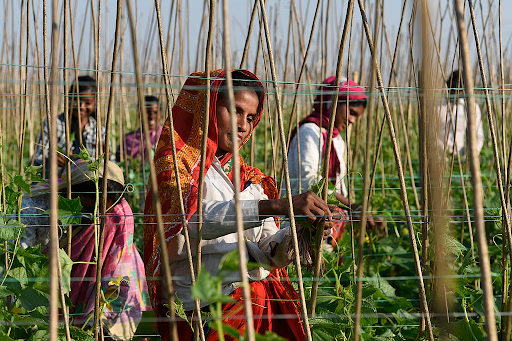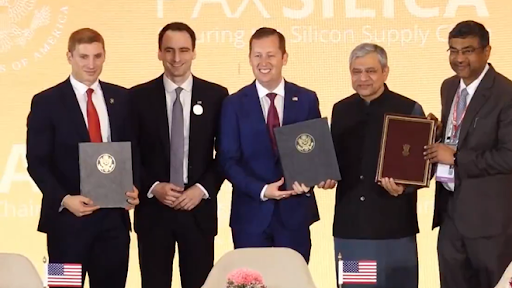



Indian farmers and scientists oppose expanding the ITPGRFA to all crops at the Lima summit. They fear loss of seed sovereignty, biopiracy, and weak benefit sharing. They insist on mandatory payments and strict DSI regulation before any change, arguing the current system already fails developing countries.

Copyright infringement not intended
Picture Courtesy: DOWNTOEARTH
Farmer unions, agricultural experts, and civil society organizations have urged the government to reject proposed amendments to the International Treaty on Plant Genetic Resources for Food and Agriculture (ITPGRFA).
The ITPGRFA, also known as the "Seed Treaty" or "Plant Treaty," is a legally binding international agreement administered by the Food and Agriculture Organization (FAO) of the United Nations.
It was adopted in 2001 and came into force in 2004. India ratified the treaty in 2002.
Conservation and Sustainable Use: Promote the conservation and sustainable use of Plant Genetic Resources for Food and Agriculture (PGRFA), crucial for crop improvement and climate change resilience.
Access and Benefit-Sharing: Establish a global Multilateral System (MLS) to share a pool of key plant genetic materials for farmers, breeders, and scientists.
Fair and Equitable Benefits: Fairly share benefits from using materials, including information, technology, capacity-building, and a Benefit-sharing Fund (BSF).
Recognition of Farmers' Rights: Governments must protect the traditional knowledge and seed rights (save, use, exchange, sell) of local/indigenous communities and farmers, vital to crop diversity.
Multilateral System (MLS): Facilitates access to 64 food and forage crops essential for food security and interdependence via the Standard Material Transfer Agreement (SMTA).
Benefit-sharing Fund (BSF): Channels monetary and other benefits, including a percentage of sales from commercial MLS products (if restricted), to support projects in developing countries for conserving and utilizing crop diversity.
Global Information System (GLIS): A portal for sharing information and knowledge on PGRFA, including genetic resource data for research and breeding.
Expansion of Annex I: The proposed expansion of the Multilateral System (MLS) to include nearly all PGRFA (up from 64) would compel biodiverse nations like India to share almost all their plant germplasm via the treaty.
Inclusion of Digital Sequence Information (DSI): Include DSI in the treaty's benefit-sharing, allowing commercial product development using genetic data from online databases, bypassing the need for physical samples.
Threat to Farmers’ Rights
The Protection of Plant Varieties and Farmers’ Rights (PPV&FR) Act, 2001, is a sui generis law that grants extensive rights to farmers.
The proposed amendments, shifting towards the stricter, breeder-centric model of the International Union for the Protection of New Varieties of Plants (UPOV), may dismantle the protections.
|
India's PPV&FR Act, 2001 |
UPOV Convention Model |
|
|
Primary Focus |
Balances rights of breeders and farmers. Recognizes farmers as cultivators, conservers, and breeders. |
Primarily protects the rights of corporate breeders. |
|
Seed Saving & Exchange |
Farmers have the explicit right to save, reuse, and exchange seeds of protected varieties. |
Restricts farmers' rights to save and exchange seeds, prioritizing the breeder's commercial interests. |
|
Registration |
Allows registration of farmers' varieties. |
Focuses on new, distinct, uniform, and stable varieties developed by breeders. |
The Rise of "Digital Biopiracy"
Concern that corporations might download India's plant varieties' Digital Sequence Information (DSI) to gene-edit and patent a "new" variety using tools like CRISPR, thus avoiding benefit-sharing with conserving communities.
The UN Biodiversity Conference (COP16) established the "Cali Fund," a new global fund, to implement a benefit-sharing mechanism for DSI. India supported this to protect developing countries' sovereign rights.
Ineffective Benefit-Sharing Mechanism
Critics point out that the treaty’s existing Benefit-sharing Fund (BSF) has been insufficient. Since its inception in 2009, the BSF has invested about $35 million in 108 projects across 78 developing countries as of 2025. (Source: FAO)
India's Domestic Legal Framework to safeguard biodiversity and community rightsThe Biological Diversity Act, 2002: Enacted to implement the CBD, this Act asserts India's sovereignty over its biological resources. It established a three-tiered structure for implementation:
|
Reject Annex I Expansion: Oppose the expansion of the MLS to include all PGRFA, as it undermines national sovereignty and laws like the Biological Diversity Act.
Advocate for a Strong DSI Framework: Lead a coalition of developing nations to ensure that DSI is governed by a legally binding mechanism for mandatory and equitable benefit-sharing.
Demand Transparency: Insist on mandatory disclosure of all genetic material transfers under the MLS to ensure accountability.
Strengthen Domestic Implementation: Accelerate the documentation of traditional knowledge in People’s Biodiversity Registers (PBRs) to prevent biopiracy and robustly implement the PPV&FR and Biodiversity Acts.
Promote Farmer-led Systems: Invest in community seed banks and participatory breeding programs to empower farmers as the primary custodians of agrobiodiversity.
India should advocate a balanced and equitable framework for the ITPGRFA amendments that respects national sovereignty, protects farmers' rights and agrobiodiversity, and ensures fair and transparent benefit-sharing from genetic wealth.
Source: DOWNTOEARTH
|
PRACTICE QUESTION Q. The term "Standard Material Transfer Agreement (SMTA)" is frequently seen in the news in the context of: A) Transfer of nuclear technology B) Exchange of genetic resources C) Cross-border data flow D) Carbon credit trading Answer: B Explanation: SMTA is a mandatory contract used for transferring genetic materials under the Multilateral System of the Seed Treaty to ensure benefit sharing. |
The core controversy involves proposed amendments to expand the treaty's scope from 64 crops to all plant genetic resources (PGRFA) and include Digital Sequence Information (DSI). Biodiverse nations, like India, worry this expansion could lead to a loss of national sovereignty over genetic resources and facilitate 'digital biopiracy' by corporations.
The Protection of Plant Varieties and Farmers’ Rights (PPV&FR) Act, 2001, recognizes farmers as cultivators, conservers, and breeders. Crucially, Section 39 legally protects farmers' traditional right to save, use, sow, re-sow, exchange, share, or sell their farm produce, including seeds of a protected variety (excluding branded seeds).
Digital Biopiracy involves creating and patenting new products, such as crops, using online genetic data (Digital Sequence Information or DSI). This practice is a concern because it bypasses international agreements, like the Nagoya Protocol, which require sharing benefits with the originating countries and communities when physical genetic resources are accessed and used.




© 2026 iasgyan. All right reserved